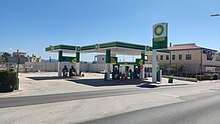
Back Vulstasie Afrikaans Benzinera AN محطة وقود Arabic Yanacaqdoldurma məntəqəsi Azerbaijani Gasolinahan BCL Pom bèngsin BEW Бензиностанция Bulgarian ফিলিং স্টেশন Bengali/Bangla Benzinera Catalan Tubilanan CEB
This article needs additional citations for verification. (February 2020) |


A filling station (also known as a gas station [US] or petrol station [UK]) is a facility that sells fuel and engine lubricants for motor vehicles. The most common fuels sold are gasoline (or petrol) and diesel fuel.
Fuel dispensers are used to pump gasoline, diesel, compressed natural gas, compressed hydrogen, hydrogen compressed natural gas, liquefied petroleum gas, liquid hydrogen, kerosene, alcohol fuels (like methanol, ethanol, butanol, and propanol), biofuels (like straight vegetable oil and biodiesel), or other types of fuel into the tanks within vehicles and calculate the financial cost of the fuel transferred to the vehicle. Besides gasoline pumps, one other significant device which is also found in filling stations and can refuel certain (compressed-air) vehicles is an air compressor, although generally these are just used to inflate car tires.
Many filling stations provide convenience stores, which may sell convenience food, beverages, tobacco products, lottery tickets, newspapers, magazines, and, in some cases, a small selection of grocery items, such as milk or eggs. Some also sell propane or butane and have added shops to their primary business. Conversely, some chain stores, such as supermarkets, discount stores, warehouse clubs, or traditional convenience stores, have provided fuel pumps on the premises.